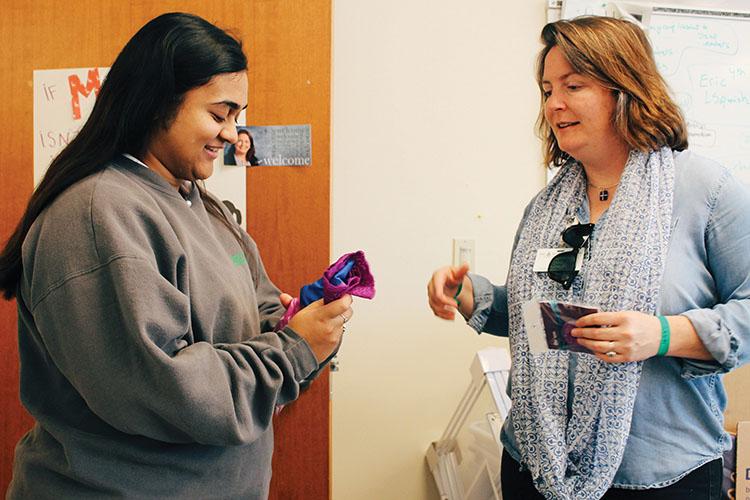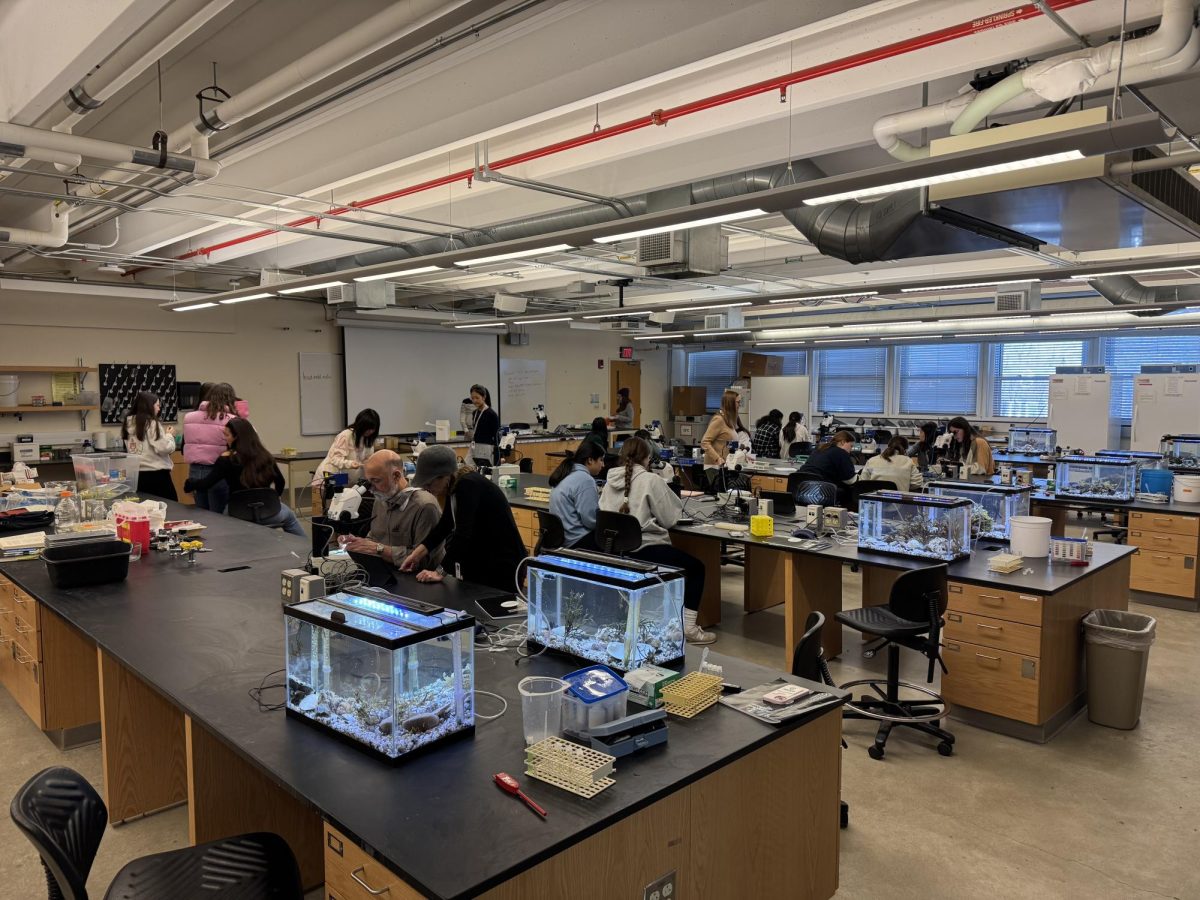//PICTURED ABOVE: Anika Bandarpalle works with Laura Day and the company Be Girl to spread awareness about reusable period underwear.
It’s a normal day at The Hockaday School. Surreptitiously, a student grabs a tampon from her backpack and shoves it up her sleeve, hoping to avoid a loud rustle from the wrapper. To her horror, it slips through her sweatshirt and clangs against the ground. She shrinks with embarrassment, feeling her entire class’ eyes on her.
Hockaday juniors Anika Bandarpalle and Riyana Daulat are fighting menstrual inequality.
Bandarpalle has been working with Laura Day, Director of The William B. Dean Service Learning Program, and the company Be Girl to create her club: Period Pals.
Daulat is working to put an end to the tampon tax in Texas. Recently, she traveled to Austin to state her case in front of the Ways and Means Committee, the chief tax writing committee of the House of Representatives.
Anika Bandarpalle
Banderpalle seeks to spread awareness throughout Hockaday about period poverty itself, where it stems from, ways students can help and the effects of period products on the environment. She hopes to accomplish this in her club Period Pals which will be created next year.
“There aren’t a lot of organizations where it’s clear what kind of outside help people need, whether it’s financial donations or supplies,” Bandarpalle said. “A big part of the club will be raising awareness about the issue and bringing the conversation to the Hockaday community on a bigger scale, but also teaming up with organizations who are coming up with a solution for this and asking what we could do for help.”
Bandarpalle works with Day and the company Be Girl to achieve her goals.
Founded in 2014 by Diana Sierra, Be Girl works to end the lack of safe menstrual health management globally and eradicate the cultural stigmas surrounding menstruation. It also concentrates on the waste produced by disposable pads, tampons and applicators. Be Girl hopes to introduce and normalize more eco-friendly alternatives for period products.
Chief Operating Officer of Be Girl, Audrey Anderson, also believes in Be Girl’s mission and works to improve the lives of girls everywhere.
“Be Girl works to realize a world where being a girl does not stand in the way of health, opportunities and success,” Anderson said.
Anderson describes Be Girl’s purpose with three main points: product, education and stigma. The PeriodPanty is a two-in-one alternative that combines underwear with absorbable protection. Be Girl has also created SmartCycle, a low-tech version of a period app that helps girls know when their period is coming and understand more about it. Finally, Be Girl uses inspiring taglines such as #NothingStopsYouPeriod to change the status quo about menstruation.
Overall, Anderson and her coworkers at Be Girl want to see a change in the way menstrual health is portrayed and understood, not only in developing countries, but everywhere.
“We want to redefine the way that menstrual health is addressed. We believe it is possible to create a period product that is not just functional but beautiful, one that girls would even be proud to own,” Anderson said. “This is critical, because this is how we fight against stigma and taboos, by building girls’ confidence and pride. Because when a girl loves her body and feels proud of who she is, nothing can stop her.”
Bandarpalle has been working closely with Anderson, not just to help those in underdeveloped countries, but those right around the block.
On April 4, Bandarpalle delivered a Hockatalk titled, Red Alert: Menstrual Inequality Around the World. In her talk, she educated Hockaday students about the environmental impact of disposable period products and the cultural stigmas around menstruation and how detrimental they are to women’s health and safety.
“In some parts of Nepal, it’s a cultural tradition that when women are on their period to be banished to little huts, made out of brick and mud,” Bandarpalle said. “It’s awful because it takes away their dignity and also women are dying in these huts due to weather exposure, animal attacks or the biggest cause of death, asphyxiation from smoke inhalation. People don’t realize that this is taking women’s lives.”
Soon, Bandarpalle will speak to the Hockaday administration about providing Hockaday students with free period products in the Hockaday bathrooms and address the issue of menstrual inequality in health classes, hoping to add discussions of periods to Hockaday’s inclusive atmosphere.
“I think it’s important that Hockaday is up-to-date with period products, because it’s not something that a lot of Hockaday students think about,” Bandarpalle said. “Most of us have the privilege to be able to afford period products, but you never know who can’t. So, even if it’s just one person, I think it would make a huge difference if we had period products for free at school.”
Day and Bandarpalle both emphasize that menstrual inequality is present everywhere. Day even works with women who struggled or struggles first hand with the issue.
“[Menstrual inequality] happens down the street. Recently I learned about a woman who couldn’t go to a job interview because she didn’t have access to sanitary products,” Day said. “Awareness is key and people actually understanding this as an issue; as well, as women I think it’s important for us to understand. It’s a global problem, but also it’s a down-the-street problem.”
Bandarpalle wants to bring awareness to the issue of menstruation and its environmental impact to Hockaday and then spread her message across the world.
“I would really encourage people to educate themselves and do their own research, for the environmental aspect. Something I talked about in my Hockatalks was organic tampons. They are more expensive, but they are better for the environment because there aren’t those chemicals leaching into landfills. So, if you can afford it, there are really good environmentally-friendly alternatives,” Bandarpalle said.
Riyana Daulat
Similarly, Daulat is focusing on the tampon tax by trying to repeal it in Texas and spread awareness at Hockaday.
Working with the Texan women’s empowerment organization Deeds Not Words, Daulat left immediately after school April 30 and traveled to Austin to read her testimony concerning the tampon tax in Texas.
The next morning, she registered in the Capitol building and then walked to the Ways and Means Committee room.
Daulat read her testimony, focusing on the unfairness of the tax on tampons, in front of 11 representatives: nine men and two women.
“Right now, the state does not consider tampons and pads to be medically necessary, so it charges a tax on it,” Daulat said. “Things like chapstick, bandaids, sunscreen and even nicotine gums are exempt from sales tax because they say they are medically necessary.”
She continued to drive her point home by explaining that women use 12,000 to 16,000 tampons and pads throughout their entire lifetime.
“So how can something that’s used so much by so many people be charged with sales tax? It’s something that we need, it’s not like it’s a luxury,” Daulat said. She also stated that many impoverished women have to wear tampons for a dangerously long time or cannot afford them at all. The excess use of one tampon can cause Toxic Shock Syndrome (TSS) and other deadly bacterial infections. Although only women need to use tampons, male-oriented products, such as Viagra and condoms are also deemed medically necessary and are therefore not taxed in Texas. “This is not a partisan issue because everybody has wives, mothers or daughters who are all facing the same problem,” Daulat said.
Representative Donna Howard of Texas, who filed the bill, made closing remarks at the hearing saying that the bill will not likely pass through the House and Senate by the end of this current political session May 27. She did, however, assure Daulat that if it doesn’t pass, she will refile the bill.
While she waits to hear the verdict, Daulat hopes to gain more signatures on her online change.org petition. Through her petition, Daulat hopes to raise awareness in the Hockaday community and spur others to speak out for the cause.
To get involved, anyone could do research of their own, join politically active organizations, or simply speak up.
“By speaking out about the issue – be it in public platforms, through social media or simply with each other – students can affect change,” Anderson said.
Story by Ava Berger
Photo by Haylee Salopek









